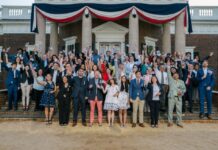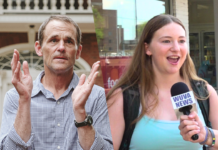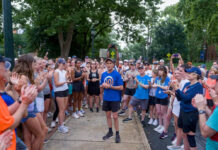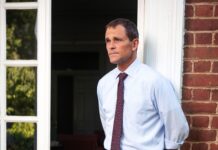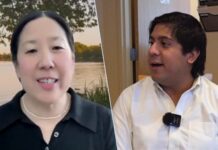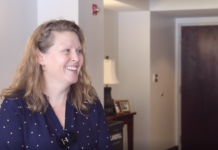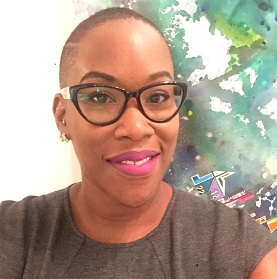
The events of August 12th happened just weeks before Meredith Clark was to start her first year of teaching in the Media Studies department at UVA. For this new professor, there was only one option of how to handle the situation in her classes: she was not going to avoid talking about the painful problems of that day.
“I stepped in on the first day of class and said, ‘This is going to be a space where we can talk about these issues,’” she says. “We’re not always going to have the right language to talk about them, and people may get offended. My job is to step in and make to sure that no one’s intentionally trying to hurt another person, but you have to give each other enough grace to talk about these things, and to talk about them freely.’”
Clark came to UVa after traveling extensively for schooling and research. Raised in Lexington, Kentucky, the esteemed media scholar traveled to Florida A&M University for her undergraduate degree before going to the University of North Carolina at Chapel Hill for her PhD. After finishing her studies, Clark moved south to work as a professor at the University of North Texas for three years before relocating to Charlottesville.
She came to UVa earlier this fall to teach “MDST 3559: Reading Black Digital Culture,” a groundbreaking new course on a phenomenon known as Black Twitter – a term used to describe the large network of Black users on Twitter that often brings attention to issues of interest in the Black community. Clark notes that being able to teach the course brought her a sense of both challenge and excitement.
“It’s overwhelming! I’m really excited to be here,” she says. “This was kind of my dream school from an occupational standpoint. There are a lot of moving parts. There are things to learn every day.”
Clark applies this same excitement to her exploration of the novel field of research of which she is a part: the intersection of race, media, and power. For her dissertation on Black Twitter, Clark has won numerous awards and was even put on The Root’s 2015 list of the top 100 most influential African Americans in the country. Clark says that this research is aimed at really bringing attention to people and issues that have long gone unnoticed.
“Some of the high-level things that I have found are that, in general, mainstream new media and the Academy often tend to either ignore or downplay the contributions of people of color in media,” she explains. “My work focuses on bringing those contributions to the forefront.”
Her interest in media and race actually began in high school, when she realized that her interest in journalism could be used to explore the topics.
“I was concerned about specifically how black people were portrayed in media and what that meant for people who consumed media who perhaps had stereotypical portrayals of black people in it,” she tells WUVA News.
Today, this decades-old fascination still informs the ways in which Clark performs her research.
“I do everything from news driven representation, in terms of [asking] is the news room diverse and does it represent the community it serves, to online community building like with Black Twitter.”
This interest in race and community is one reason why the events of August 12th were so relevant to Clark and her teaching when she came to UVa. However, she also worried about her students simply because of the impact such an event could have on their overall wellbeing, especially given students’ knowledge of the school’s history.
“Professionally, my primary concern was how students were handling it because it’s very uncomfortable to all of a sudden have your school be in the middle of a controversy like this one, especially when your school does have this history of being essentially built on the backs of slaves,” she explains.
But while she might have been shocked at the timing in regard to her own move to the small college town, Clark says that she “was not really surprised” about the occurrence of the event itself. To her, the question now is what people will do about it.
“For me the major concern I have is what is everyday life like in Charlottesville and what happens 2 to 3 years down the road…” she says. “Does life go back to normal after that? And what does that normal look like?”
Smiling, she explains, “I’m of the age where you’ve seen a lot and you know that life goes on, the planet continues to spin, and you just try to do your best.”
As a teacher of racial issues and relations, Professor Clark admits that – even aside from August 12th – she did have worries about becoming a professor at UVa. She says that she was “kind of concerned about coming here and teaching more white students about people of color from the perspective of a person of color.”
Luckily, Clark’s time at the institution has really opened her own eyes to what can happen when you have important conversations – just as she hopes it has done for her students.
“I have really, really been proud of the way that the students have reacted to the material, I had no idea what to expect,” she explains. “I am challenged every day in this class and I like that. I like to see the way that they filter the material through their own experiences.”
To learn more about Professor Clark and her research, click here.







